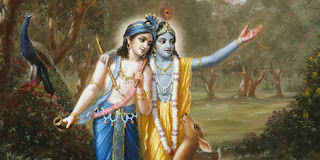 Preparing and offering food to the Lord shows Him our devotion and gratitude. Krishna doesn't need to eat, of course, but He accepts the love with which we offer food to Him.
Preparing and offering food to the Lord shows Him our devotion and gratitude. Krishna doesn't need to eat, of course, but He accepts the love with which we offer food to Him.As far as possible, use fresh, natural ingredients for cooking. Krishna accepts only vegetarian food, and packaged, store-bought products may contain meat, fish, or eggs. So read labels carefully.
Cleanliness is important in cooking for Krishna. Wash your hands before you begin. And don’t taste the food while cooking; the meal is for Krishna’s pleasure, so He should taste it first.
It’s best to have a new set of dinnerware used only for Krishna’s offerings and not used by anyone else.
Place the plate in front of Krishna and ask Him to accept the offering. Then, in a mood of assisting the pure devotees, offer the preparations to Krishna while reciting the following prayers:
Prayers for Offering Food to Krishna
nama om vishnu-padaya krishna-preshthaya bhu-tale
srimate bhaktivedanta-svamin iti namine
namas te sarasvate deve gaura-vani-pracarine
nirvisesha-sunyavadi-paschatya-desa-tarineI offer my respectful obeisances unto His Divine Grace A.C. Bhaktivedanta Swami Prabhupada, who is very dear to Lord Krishna, having taken shelter at His lotus feet. Our respectful obeisances are unto you, O spiritual master, servant of Bhaktisiddhanta Saraswati Goswami. You are kindly preaching the message of Lord Chaitanyadeva and delivering the Western countries, which are filled with impersonalism and voidism.namo maha-vadanyaya
krishna-prema-pradaya te
krishnaya krishna-chaitanya-
namne gaura-tvishe namahO most munificent incarnation! You are Krishna Himself appearing as Sri Krishna Chaitanya Mahaprabhu. You have assumed the golden color of Srimati Radharani, and You are widely distributing pure love of Krishna. We offer our respectful obeisances unto You.namo brahmanya-devaya
go-brahmana-hitaya ca
jagad-dhitaya krishnaya
govindaya namo namahMy Lord, You are the well-wisher of the cows and the brahmanas, and You are the well-wisher of the entire human society and world.You can also chant the Pancha Tattva and Hare Krsna mantras three times:sri-krishna-chaitanya prabhu-nityananda
sri-advaita gadadhara srivasadi-gaura-bhakta-vrinda“I offer my obeisances to Sri Krishna Chaitanya, Prabhu Nityananda, Sri Advaita, Gadadhara, Srivasa and all others in the line of devotion”Hare Krishna, Hare Krishna, Krishna Krishna, Hare Hare
Hare Rama, Hare Rama, Rama Rama, Hare Hare
Leave the plate there for a few minutes, just as you would if a loved one was eating.
Remove the plate, transfer the food to a serving plate, and wash Krishna’s dinnerware. The food is now prasadam, or “mercy” from Krishna.
While you eat, consider the spiritual value of the food; because Krishna has accepted it, it is spiritually identical to Him. Therefore by eatingprasadam you become purified.
Everything you offer Krishna becomes spiritualized prasadam—flowers, incense, water, food. All prasadam should be respected and shared with others. Spread the mercy around.











